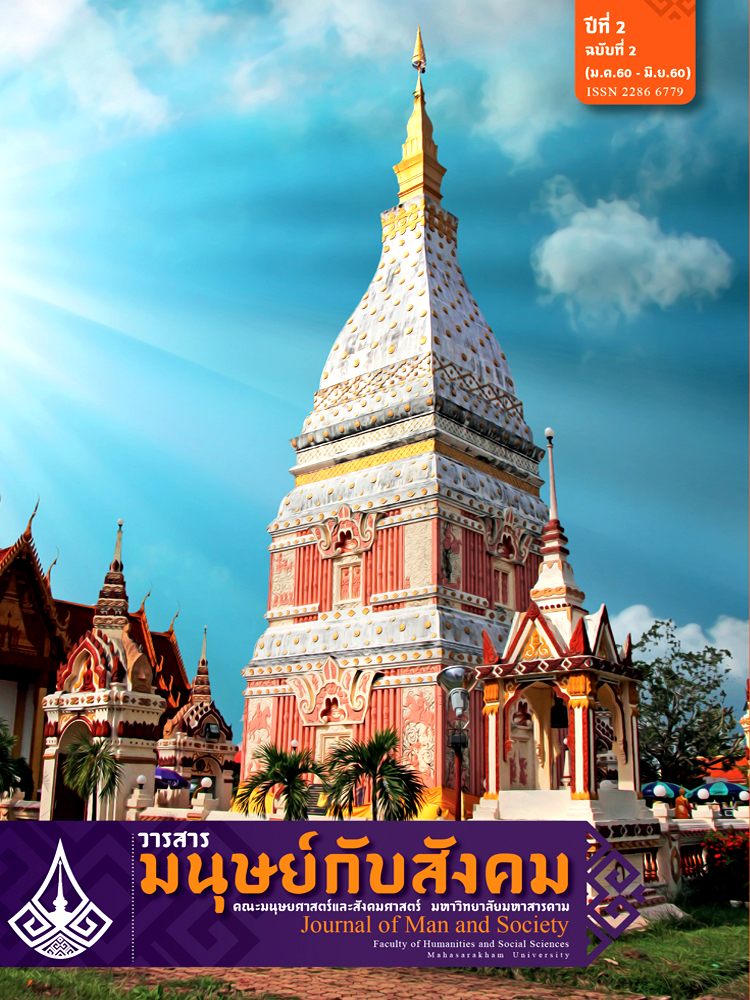“ตุ๊กตารอยทราย” การผสานกวีนิพนธ์ปรัชญา ศาสนาและกวีนิพนธ์เพื่อชีวิต
Main Article Content
บทคัดย่อ
บทความนี้มีจุดประสงค์เพื่อศึกษาบทกวีในหนังสือรวมบทกวี ตุ๊กตารอยทราย ของศักดิ์ศิริ มีสมสืบ ในด้านแนวความคิด ความหมาย สภาพสังคม และอิทธิพลของการสร้างสรรค์บทกวี ที่เกิดจากการผสมผสานมโนทัศน์ของบทกวีปรัชญาลัทธิเต๋าและเซ็น กับมโนทัศน์ของบทกวีสะท้อนสังคมหรือบทกวีเพื่อชีวิต โดยศักดิ์สิริได้สร้างสรรค์ให้กลายเป็นบทกวีที่มีลักษณะเฉพาะตัว ไม่เคร่งครัดตามฉันทลักษณ์แบบเดิม และมีมุมมองที่แปลกใหม่ รวมบทกวีตุ๊กตารอยทรายมุ่งเสนอแนวคิดหรือปรัชญาที่ชวนให้ดำเนินชีวิตอย่างง่ายงาม แอบอิงกับธรรมชาติและธรรมะที่จริงแท้ ลดละกิเลส ไม่เบียดเบียนตนเอง ผู้อื่น และสิ่งแวดล้อม ซึ่งกวีเสนอว่าจะเป็นหนทางสงบสันติในโลกอันสับสนวุ่นวาย
Article Details

อนุญาตภายใต้เงื่อนไข Creative Commons Attribution-NonCommercial-NoDerivatives 4.0 International License.
เนื้อหาและข้อมูลที่ตีพิมพ์ลงในวารสารมนุษย์กับสังคม ถือเป็นข้อคิดเห็นและความรับผิดชอบโดยตรงของผู้เขียนซึ่งกองบรรณาธิการวารสารไม่จำเป็นต้องเห็นด้วยหรือร่วมรับผิดชอบใดๆ
บทความ ข้อมูล เนื้อหา รูปภาพ ฯลฯ ที่ได้รับการตีพิมพ์ในวารสารมนุษย์กับสังคม ถือเป็นลิขสิทธิ์ของวารสาร หากบุคคลหรือหน่วยงานใดต้องการนำทั้งหมดหรือส่วนหนึ่งส่วนใดไปเผยแพร่ต่อหรือเพื่่อกระทำการใดๆ จะต้องได้รับอนุญาตเป็นลายลักษณ์อักษรจากวารสารมนุษย์กับสังคมก่อน
เอกสารอ้างอิง
เซนไค ชิบายามะ. (2522). ดอกไม้ไม่จำนรรจ์. (พจนา จันทรสันติ, ผู้แปล). กรุงเทพฯ: ลายสือไทย.
นัท ฮันห์, ติช. (2552). กุญแจเซ็น. (พจนา จันทรสันติ, ผู้แปล). พิมพ์ครั้งที่ 10. กรุงเทพฯ: มูลนิธิโกมลคีมทอง.
ทองแถม นาถจำนง และเนาวรัตน์ พงษ์ไพบูลย์. (2530). กวีเต๋า เถาหยวนหมิง. กรุงเทพฯ: ก. ไก่.
ธัญญา สังขพันธานนท์. (2538). ปรากฎการณ์แห่งวรรณกรรม. กรุงเทพฯ: นาคร.
พจนา จันทรสันติ. (2525). วิถีแห่งเต๋า หรือ เต๋า เต็ก เก็ง. พิมพ์ครั้งที่ 5. กรุงเทพฯ: เคล็ดไทย.
พิเชฐ แสงทอง. (2550). วาทกรรมวรรณกรรม. มหาสารคาม: มหาวิทยาลัยมหาสารคาม.
ศักดิ์สิริ มีสมสืบ. (2526). ตุ๊กตารอยทราย. กรุงเทพฯ: เคล็ดไทย.
สมภาร พรมทา. (2525). กระท่อมวิเวก. กรุงเทพฯ: จตุจักร.


